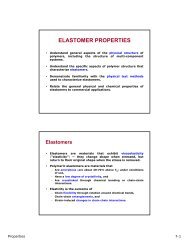Sociology of the Anarchists - Gozips.uakron.edu - The University of ...
Sociology of the Anarchists - Gozips.uakron.edu - The University of ...
Sociology of the Anarchists - Gozips.uakron.edu - The University of ...
Create successful ePaper yourself
Turn your PDF publications into a flip-book with our unique Google optimized e-Paper software.
<strong>The</strong> increased focus upon anarchism may be attributed to, in part, <strong>the</strong> recent boom,<br />
especially in <strong>the</strong> West, to punk music subculture 5 and <strong>the</strong> proliferation <strong>of</strong> <strong>the</strong> Internet.<br />
Politically, recent anarchist organizing internationally may be explained by <strong>the</strong> decline<br />
and subsequent failure <strong>of</strong> <strong>the</strong> authoritarian socialist states <strong>of</strong> <strong>the</strong> USSR and Eastern<br />
Europe. Since <strong>the</strong>y represent a failed attempt to oppose capitalism, anarchism has once<br />
again risen to fill <strong>the</strong> void on <strong>the</strong> radical, anti-capitalist Left.<br />
Although frequently overlooked in <strong>the</strong> academy, anarchism has been <strong>of</strong> sharp focus by <strong>the</strong><br />
western media for a number <strong>of</strong> years now (again). Since <strong>the</strong> late 1990s, and especially<br />
after <strong>the</strong> anti-WTO meetings in Seattle, anarchists have been a fashionable target for<br />
media speculation and exaggeration. Reporters and popular writers have mused about<br />
anarchism, usually looking for a sensationalist hook for a story. <strong>The</strong> New York Times<br />
referred to anarchism—perhaps with dismay—as “<strong>the</strong> creed that won't stay dead” (Kahn<br />
2000). Newsweek showed its surprise: “<strong>Anarchists</strong>... where did <strong>the</strong>y come from?”<br />
(12/13/99, p. 4) Of course, most <strong>of</strong> this news coverage treats anarchism as merely ano<strong>the</strong>r<br />
spectacle in our crazy society, and usually divorces anarchists from <strong>the</strong>ir politics. Also<br />
curious is <strong>the</strong> frequent usage <strong>of</strong> <strong>the</strong> phrase “self-styled” to describe anarchists, as if socalled<br />
anarchists are just “pretending” to be anarchists—sort <strong>of</strong> how maybe Democrats<br />
pretend to be Democrats or how baseball players are just pretending to be baseball<br />
players. Funny how we never hear <strong>of</strong> “self-styled Democrats” or “self-styled baseball<br />
players”!! [Do a Lexis-Nexis search on this phrase to show if it is being used more<br />
<strong>of</strong>ten now.] This is apparently ano<strong>the</strong>r attempt to convince <strong>the</strong> public that anarchists are<br />
merely confused and ill-informed trouble-makers.<br />
Anarchism fits into sociological <strong>the</strong>ory in <strong>the</strong> following two ways: 1) it <strong>of</strong>fers a critique<br />
<strong>of</strong> <strong>the</strong> problems in contemporary society and 2) it <strong>of</strong>fers a vision <strong>of</strong> a better society and<br />
ideas on how to move towards it. Thus, anarchism is nei<strong>the</strong>r only an “anti” movement<br />
against society, nor is it an arrogantly Utopian fantasy disconnected from reality. Ra<strong>the</strong>r,<br />
it <strong>of</strong>fers both critique and proposal on society and its issues. <strong>Sociology</strong> (particularly an<br />
activist sociology) would benefit, I think, from considering <strong>the</strong>se two perspectives.<br />
Anarchist scholarship in <strong>the</strong> social sciences is typically conducted in non-sociology fields,<br />
such as History or Political Science. In <strong>the</strong>se disciplines, <strong>the</strong> emphasis is on <strong>the</strong> past<br />
movements and figures <strong>of</strong> anarchism or <strong>the</strong> actions <strong>of</strong> non-state political actors (or worse,<br />
<strong>the</strong> process <strong>of</strong> political chaos). 6 It also has relevancy within economics as a nonmarket/capitalist<br />
version <strong>of</strong> goods/exchange. Anthropologically, it is akin to sociobiology<br />
and <strong>the</strong> development <strong>of</strong> human societies in a pre-state period.<br />
After a strenuous overview <strong>of</strong> <strong>the</strong> various traditions within sociology, one is almost<br />
drawn to a post-modernist analysis <strong>of</strong> <strong>the</strong> inter-plays with anarchism. All four <strong>of</strong> <strong>the</strong><br />
traditions studied below (conflict, utilitarian, functionalism, and symbolic interaction)<br />
5 For an article critical <strong>of</strong> <strong>the</strong> union between anarchism and punk, see Nomous (2001?); and a view that<br />
praises <strong>the</strong> connection (O'Hara 1999). Anarcho-punk bands include: Against Me!, Aus-Rotten,<br />
Chumbawumba, Citizen Fish, Conflict, Crass, <strong>The</strong> Ex, Nausea, No Use for a Name, Oi Polloi, Poison<br />
Girls, Propagandhi, Reagan Youth, <strong>The</strong> Refused, <strong>The</strong> Subhumans, etc. (Source:<br />
http://en.wikipedia.org/wiki/Anarcho-punk )<br />
6 Please see <strong>the</strong> chapter Academia's Anarchistic “Wannabes” for more about how Political Science<br />
[predictably] gets it wrong 99 percent <strong>of</strong> <strong>the</strong> time.<br />
[ Williams 11 ] [ this is a draft. do not cite. ]






